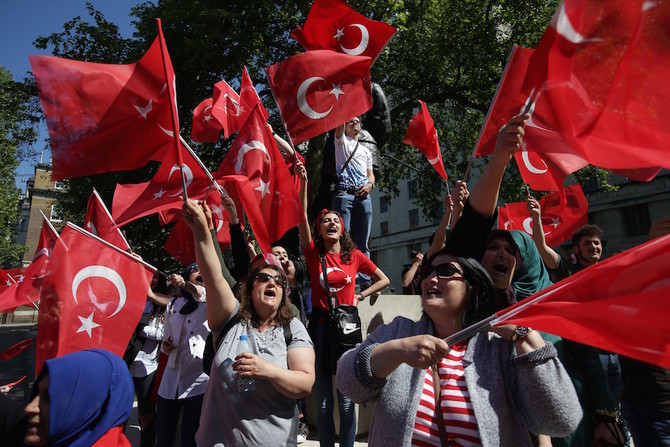LONDON: A butcher’s shop is not an obvious place for a heated debate, but when the subject is the forthcoming elections in Turkey and the customers are split between support for the incumbent, President Recep Tayyip Erdogan, and his opponents, it does not take long for voices to start rising and arms to start waving.
However, we are not in a back street in Istanbul or Ankara but in northeast London, though you would never know. Green Lanes is not a street where you will hear much English.
The shops and cafes all have Turkish names, as do the two social clubs. The men — the customers are invariably male — in every one of those establishments apologize for their poor command of English.
They are not merely being self-effacing. Their English is shaky. How long have they lived in Britain? “Twelve years,” says Tarkan Bahadur. “Twenty-nine years,” says Adnan Guzelkasap. Osman Alae beats them all. “Forty-one years,” says the 65-year-old.
Turkey goes to the polls on June 24 to elect a new president, or to keep the existing one. But voting for Turks living overseas begins on Saturday and continues until Tuesday.
Adnan Guzelkasap, 54, the owner of the butcher’s shop, can barely utter Erdogan’s name, such is his disdain.
“He has no respect for democracy. He wants to be a dictator,” Guzelkasap said. “He hasn’t even got a degree. He won’t show his degree certificate because he can’t — he never finished university. All he understands is how to talk rubbish about the opposition parties and anyone who doesn’t agree with him, he puts them in prison. His supporters are people with not much brains.”
Guzelkasap is also worried by the influx of Syrian refugees which Turkey has absorbed under an agreement with the European Union. “Turkey is a poor country, but we have to support all these people who pay no taxes and bring nothing to the country.”
Two of his assistants, however, are fervently pro-Erdogan. “I love him,” said Tarkan Bahadur, 45. “He is doing a good job, building bridges and good roads. He pays benefits to old people. And he is a religious man and religion is important.”
Guzelkasap interjected. “Forget about the bridges. What about that big palace he built for himself?” he said, referring to the 1,100-room Ak Saray (White Palace) the president had built in Ankara in 2014 at a cost of $650 million.
Erdogan has always had strong appeal among working-class, rural, conservative Turks. But his opponents say he also exploits their lack of sophistication and education.
“He gave washing machines and televisions to a village where they don’t have electricity, but still they were happy, even though they can’t use them,” said Guzelkasap. “He can tell them anything he wants because most of them can’t read.”
London his home to an estimated 200,000 people of Turkish origin. At the Canli Balik Cafe and Grill on Green Lanes, manager Servet Kaya, 47, is another Erdogan supporter. Recently returned from a visit to Turkey, he said the country finally looks like a modern nation.
“For 40 years, we felt powerless against the corruption. Now there are good hospitals in every main city. Erdogan is for the people,” he said.
Like the president, Kaya used to admire the cleric Fetullah Gulen, but now accuses him of masterminding the failed coup of 2016. After quashing the revolt, Erdogan imposed a state of emergency on Turkey that remains in place.
“Gulen is for the elite. He did good things for education, but he produced robots because he must be in control. He wants control not just of Turkey but the whole world. He lives in the US and his name is on nothing, but don’t worry, he is in control of everything,” said Kaya.
Over the road in the Berber Ramazan barber shop, another lively discussion ensues over delicious homemade borek, a traditional savoury with layers of pastry. The staff there are three-to-one against Erdogan. “But we are trying hard to convert him,” said Mehmet, the oldest.
Mehmet declined to give his real name. As a young man, he was a communist. In 1980, the military took control of Turkey and Mehmet was imprisoned for two years and tortured. He came to the UK 25 years ago and remains left-wing in his politics. In his eyes, Erdogan is “a fascist, who appeals to the lowest feelings in people.”
As a naturalized British citizen, Mehmet said, he can no longer vote, but even if could, he wouldn’t bother. “I’m sick and tired of the lot of them. They are all liars.”
Back in the butcher’s shop, Guzelkasap said much would depend on how the Kurdish group the People’s Democratic Party performs. “If they get more than 10 percent, Erdogan will lose. If they get less, he wins.”
His own vote will go to Muharrem Ince, of the Republican People’s Party.
It is left to Osman Alae, the elder statesman among them to sum up. “Erdogan is dangerous. He is a dictator. He used the coup as an excuse to put half the country in jail. The doesn’t work anymore. People are fed up,” he said.























